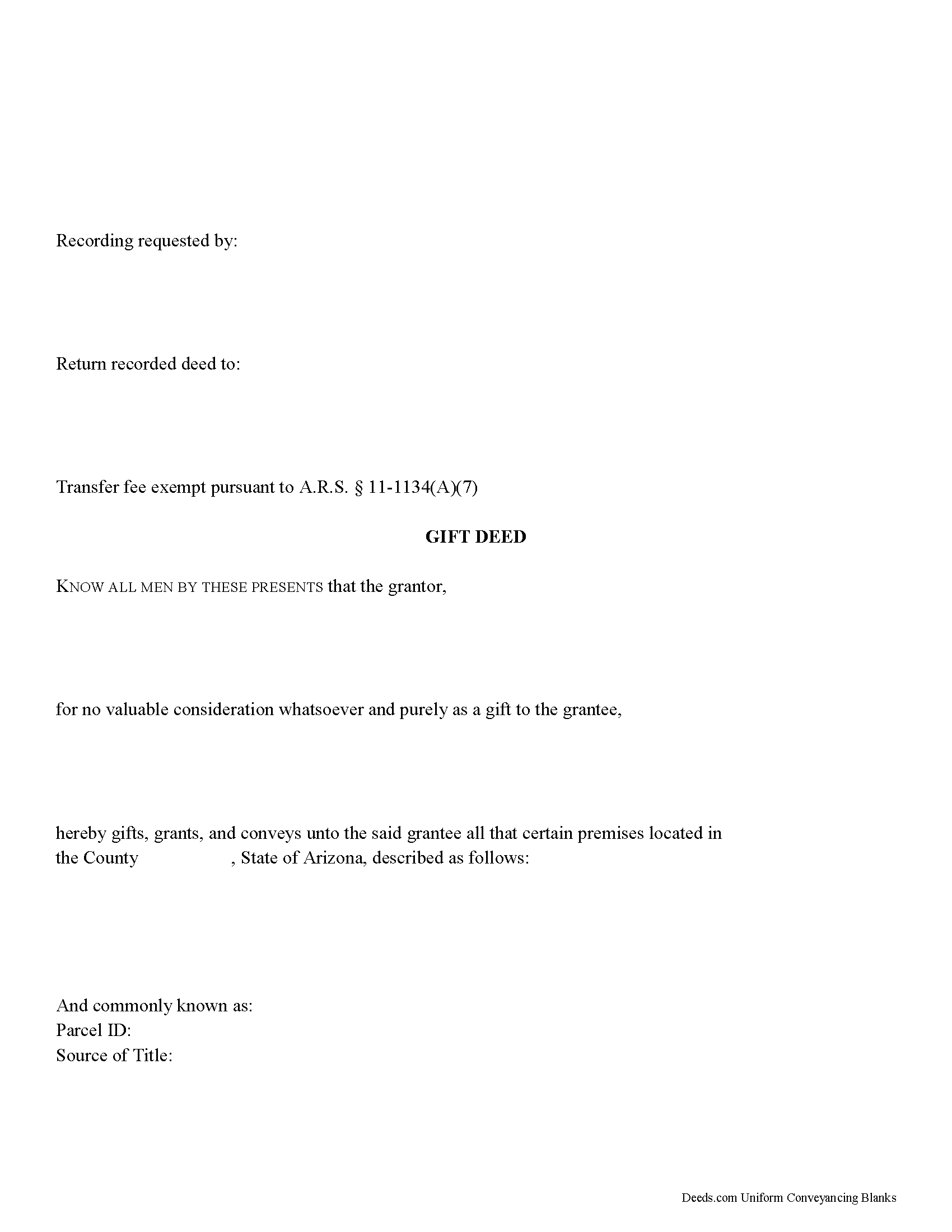Download Arizona Gift Deed Legal Forms

Arizona Gift Deed Overview

Gift deeds convey title to real property from one party to another with no exchange of consideration, monetary or otherwise. Often used to transfer property between family members or to gift property as a charitable act or donation, these conveyances occur during the grantor's lifetime.
Gift deeds must contain language that explicitly states that no consideration is expected or required. Ambiguous language, or references to any type of consideration, can make the gift deed contestable in court.
Arizona property owners can transfer real estate with implied covenants of title. By including the words "grant" or "convey," the grantor (seller) guarantees that he or she has not transferred title to the property to anyone other than the grantee (buyer), and that, at the time of legal transfer of property, the estate is free from any impediments to the transfer. Implied covenants carry the same legal implications as if they were explicitly stated (A.R.S. Section 33-435).
A lawful gift deed includes the grantor's full name, marital status, and mailing address, as well as the grantee's full name, marital status, mailing address, and vesting. Vesting describes how the grantee holds title to the property. Generally, real property is owned in either sole ownership or in co-ownership. For Arizona the primary methods for holding title in co-ownership are tenancy in common, joint tenancy, and community property. An estate conveyed to two or more persons vests as a tenancy in common unless otherwise specified. A conveyance to a married couple typically vests as community property, but when real property is gifted to one spouse, the gift is not presumed to be community property (A.R.S. Sections 33-431, 25-211).
As with any conveyance of realty, a gift deed requires a complete legal description of the parcel. Recite the source of title to establish a clear chain of title, and detail any restrictions associated with the property. Finally, the deed must meet all state and local standards for recorded documents. Sign the deed in the presence of a notary public or other authorized official (A.R.S. Section 33-401(B)). Record the deed, along with any supplemental materials, at the recorder's office of the county where the property is located for a valid transfer. Contact the same office to confirm accepted forms of payment.
Gift deeds in Arizona are exempt from two requirements associated with other title transfers: the real estate transfer fee and the affidavit of property/legal value (A.R.S. Section 11-1134(A)(7)).
Arizona does not levy a state gift tax, but gifts of real property are still subject to the federal gift tax. The person or entity making the gift (grantor or donor) is responsible for paying the federal gift tax; however, if the donor does not pay the gift tax, the donee (grantee) will be held liable. The recipient of the gift (grantee or donee) is not required to declare the amount of the gift as income, but if the property accrues income after the transaction, the grantee is responsible for paying the requisite state and federal income tax. For questions regarding state and federal tax laws, consult a tax specialist.
This article is provided for informational purposes only and is not a substitute for legal advice. Contact an attorney with questions about gift deeds, or for any other issues related to the transfer of real property in Arizona. Seek guidance from a tax or estate planning professional for information about the tax consequences associated with gifts of real property.
(Arizona Gift Deed Package includes form, guidelines, and completed example)